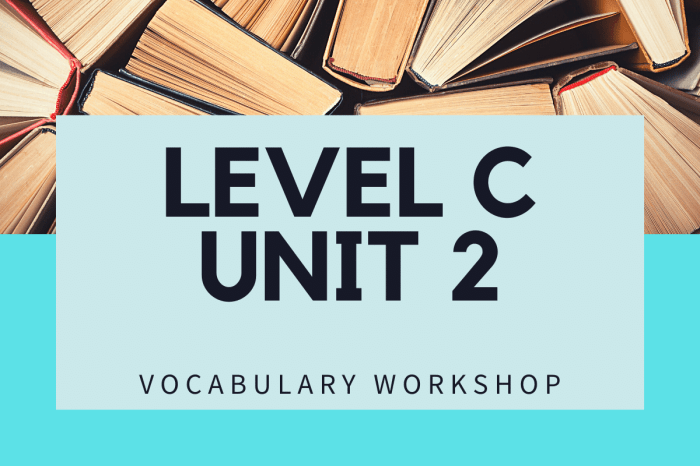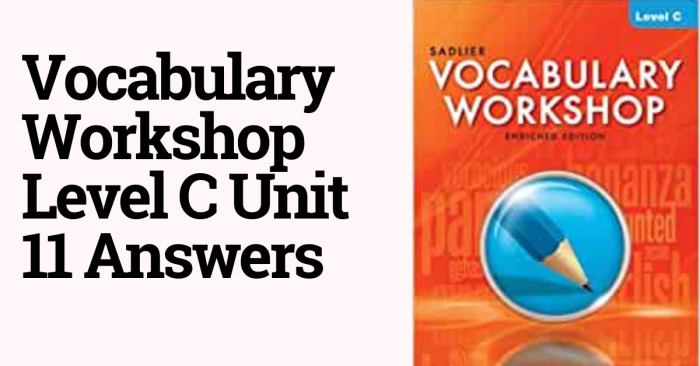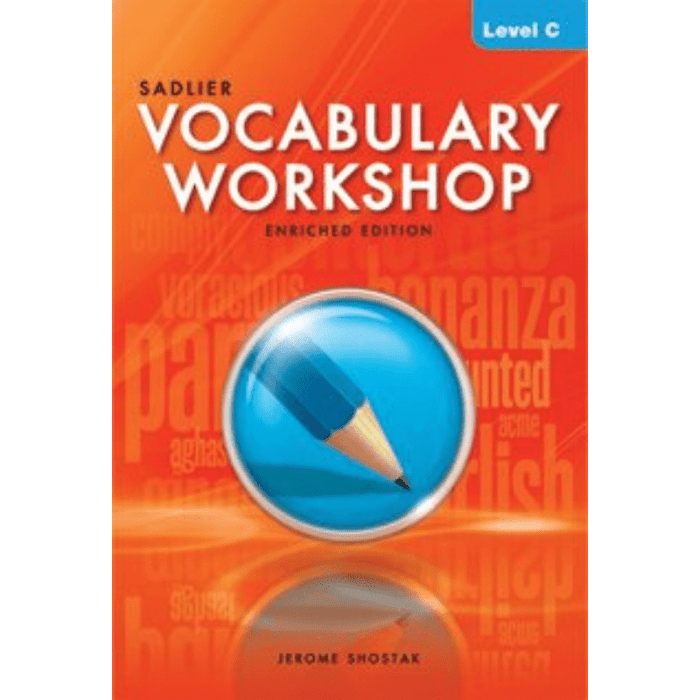Embarking on a linguistic journey with Vocabulary Workshop Level C Unit 11, this comprehensive unit delves into strategies for vocabulary expansion, word recognition, spelling skills, interactive activities, assessment techniques, and cross-curricular integration. Designed to ignite a passion for language learning, this unit empowers students to become proficient communicators and critical thinkers.
Through engaging activities and evidence-based methodologies, Vocabulary Workshop Level C Unit 11 fosters a deep understanding of vocabulary, enhancing reading comprehension, writing abilities, and overall academic achievement. Join us as we explore the intricacies of this transformative unit, empowering educators with the tools to cultivate a love of language in their students.
Unit Overview
Vocabulary Workshop Level C Unit 11 aims to enhance students’ vocabulary skills by introducing new words and phrases related to the theme of “Science and Technology.”
Through engaging activities and exercises, students will explore the etymology, usage, and nuances of these terms, expanding their understanding of scientific concepts and technological advancements.
Vocabulary Acquisition

Vocabulary acquisition is a critical component of language learning. In this unit, students will expand their vocabulary through a variety of strategies, including explicit instruction, contextual exposure, and interactive activities.
Types of Vocabulary Words Introduced
The vocabulary words introduced in this unit fall into several categories:
- Academic vocabulary:Words that are commonly used in academic settings, such as “analyze,” “evaluate,” and “hypothesize.”
- Domain-specific vocabulary:Words that are related to a particular subject area, such as “photosynthesis” in science or “metaphor” in literature.
- High-frequency words:Words that are used frequently in everyday speech, such as “the,” “of,” and “and.”
Word Recognition and Spelling Skills
In addition to expanding their vocabulary, students will also develop their word recognition and spelling skills through:
- Phonics instruction:Students will learn to decode words by breaking them down into their individual sounds.
- Sight word practice:Students will memorize a list of common words that cannot be decoded phonetically.
- Spelling patterns:Students will learn common spelling patterns, such as the “igh” sound in “light” and “night.”
Vocabulary Activities

Vocabulary activities are an essential component of vocabulary instruction, as they provide students with opportunities to practice and reinforce new words in a variety of contexts.
These activities are designed to promote engagement and enhance vocabulary retention, and they can range from games and exercises to projects and presentations.
Games
Games are a fun and effective way to practice vocabulary, and they can be used to review new words, reinforce meaning, and improve pronunciation.
- Word Bingo:Students can play Bingo using vocabulary words, and the first student to complete a line or column wins.
- Charades:Students can act out vocabulary words while their classmates guess the word.
- Pictionary:Students can draw vocabulary words on a whiteboard or paper while their classmates guess the word.
Exercises
Exercises provide students with opportunities to practice using vocabulary words in different contexts.
- Fill-in-the-blank exercises:Students can complete sentences by filling in the blanks with the correct vocabulary words.
- Matching exercises:Students can match vocabulary words with their definitions or synonyms.
- Short answer questions:Students can answer questions about vocabulary words, such as their meaning, usage, or part of speech.
Projects
Projects allow students to demonstrate their understanding of vocabulary words in a creative and meaningful way.
- Vocabulary journals:Students can create vocabulary journals in which they record new words, their definitions, and examples of how to use them.
- Word walls:Students can create word walls in their classrooms or homes, where they display vocabulary words and their meanings.
- Presentations:Students can give presentations about vocabulary words, explaining their meaning, usage, and importance.
Vocabulary Assessment: Vocabulary Workshop Level C Unit 11

Vocabulary assessment is an integral part of the unit, as it allows teachers to gauge students’ understanding and application of the target vocabulary words. Various methods are employed to assess vocabulary acquisition in this unit, including:
- Formal assessments:These include quizzes, tests, and essays that evaluate students’ knowledge of vocabulary words, their meanings, and their usage in context.
- Informal assessments:These involve less structured methods of assessment, such as class discussions, games, and activities, which allow teachers to observe students’ use of vocabulary words in real-time.
These assessments measure students’ understanding and application of vocabulary words in several ways:
- Definition and meaning:Assessments may require students to define vocabulary words or explain their meanings, demonstrating their comprehension of the words’ denotations and connotations.
- Usage in context:Students may be asked to use vocabulary words in sentences or short passages, showcasing their ability to apply the words in appropriate contexts.
- Word relationships:Assessments may explore students’ understanding of word relationships, such as synonyms, antonyms, and analogies, indicating their grasp of the nuances of vocabulary.
Creating Effective Vocabulary Assessments
When creating effective vocabulary assessments, teachers should consider the following suggestions:
- Align with learning objectives:Assessments should align with the specific vocabulary learning objectives of the unit, ensuring that they measure what students have been taught.
- Variety of formats:Using a variety of assessment formats, such as multiple-choice questions, short answer questions, and essays, can cater to diverse learning styles and assess different aspects of vocabulary knowledge.
- Clear instructions:Assessments should provide clear and concise instructions, ensuring that students understand what is expected of them.
- Appropriate difficulty level:Assessments should be challenging enough to encourage students to apply their knowledge, but not so difficult that they become discouraging.
- Feedback and analysis:Provide timely and meaningful feedback on assessments, highlighting students’ strengths and areas for improvement, and using the results to inform future instruction.
Unit Integration
Vocabulary learning is a fundamental aspect of education, supporting various areas of the curriculum and enhancing overall academic achievement.Integrating vocabulary instruction with other subjects allows students to make meaningful connections between words and concepts, deepening their understanding and retention. For instance, in science, introducing technical vocabulary related to biological processes or chemical reactions helps students comprehend complex scientific concepts.
In social studies, exploring historical vocabulary enables students to analyze historical events and perspectives.
Supporting Reading Comprehension and Writing Skills
Vocabulary development is crucial for reading comprehension. Students with a strong vocabulary can decode unfamiliar words, understand the meaning of texts, and make inferences. Conversely, limited vocabulary hinders reading comprehension and affects overall academic performance.Writing also benefits from robust vocabulary.
Students with a rich vocabulary can express themselves more precisely and persuasively. They can convey their ideas clearly and engage readers with varied and nuanced language.
Cross-Curricular Activities for Vocabulary Development, Vocabulary workshop level c unit 11
Cross-curricular activities provide engaging and interactive ways to enhance vocabulary development. Here are some examples:
-
-*Science
Conduct experiments or demonstrations that introduce new scientific vocabulary related to the topic being studied.
-*Social Studies
Have students create timelines or maps that include key vocabulary terms related to historical events or geographical regions.
-*Math
Incorporate word problems that require students to use mathematical vocabulary accurately.
-*Art
Encourage students to create visual representations of vocabulary words, such as drawings, collages, or sculptures.
Vocabulary Extension

Vocabulary growth is an ongoing process that extends beyond the classroom. This unit encourages students to actively seek opportunities to expand their vocabulary through various strategies and resources.Students can independently build their vocabulary by:
- Reading widely:Engaging with diverse texts exposes students to new words and their contexts.
- Active listening:Paying attention to conversations and media helps students absorb new vocabulary.
- Using dictionaries and thesauruses:Exploring the meanings and synonyms of unfamiliar words enhances understanding.
- Keeping a vocabulary notebook:Recording new words, their definitions, and examples aids in memorization.
- Playing word games:Engaging in activities like Scrabble or crossword puzzles challenges vocabulary and encourages word exploration.
Additionally, the following resources promote ongoing vocabulary growth:
- Online dictionaries:Merriam-Webster, Oxford English Dictionary, and Google Dictionary offer comprehensive definitions and usage examples.
- Vocabulary apps:Quizlet, Memrise, and Duolingo provide interactive games and exercises to enhance vocabulary retention.
- Podcasts and audiobooks:Listening to narrated content exposes students to rich language and diverse vocabulary.
- Word of the day calendars:Subscribing to these calendars delivers a new word and its definition daily, fostering gradual vocabulary expansion.
Helpful Answers
What is the primary objective of Vocabulary Workshop Level C Unit 11?
The primary objective of Vocabulary Workshop Level C Unit 11 is to expand students’ vocabulary, enhance their word recognition and spelling skills, and foster a deep understanding of language.
How does the unit assess students’ vocabulary acquisition?
The unit utilizes a variety of assessment methods, including interactive games, exercises, and projects, to gauge students’ understanding and application of vocabulary words.
What are some tips for students to independently build their vocabulary beyond the classroom?
Students can independently build their vocabulary by engaging in wide reading, using online resources, playing word games, and keeping a personal vocabulary journal.